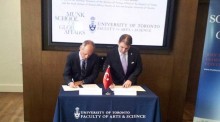His Excellency Dr. Tuncay Babali (Turkey’s Ambassador in Ottawa) recently spoke at the Munk School, discussing the role of Turkey in the global arena and the prospects for Turkey-Canada relations. The Ambassador drew on his wealth of experience, elaborating thoughts shaped by his previous postings in London and Washington and at the Ministry of Foreign Affairs in Ankara. This visit was also the occasion for the signing of a letter of intent between the Centre for Strategic Research of the Republic of Turkey’s Ministry of Foreign Affairs and the Munk School of Global Affairs, the letter signaling the exploration of opportunities for research collaboration.
Ambassador Babali’s talk surveyed Turkey’s political and economic development and its expanding role in international affairs – with his observations helping to underline the logic of Munk School plans for research engagement with the country. As an historic crossroads between regions and a contemporary global business and cultural axis, Turkey is important to understanding the global arena today. It encompasses the largest landmass in Europe and is projected to have the largest European population by 2030, while simultaneously looking towards Europe, Asia, and the Middle East and serving as a leader in South-South cooperation. It is the world’s seventeenth largest economy, with an impressive rate of growth – reaching an average annual GDP growth rate of 6 percent between 2002 and 2011 – and robust projected growth prospects. Certainly, we cannot fully understand global affairs today without grasping the strategic, political, and sociocultural implications of Turkey’s impressive economic rise.
Ambassador Babali described Turkey’s foreign policy as based on three strategic pillars: transatlantic relations, relations with regional neighbours, and relations with the EU (with EU accession being particularly important to Turkey’s economic modernization program). At the same time, Turkey serves as a critical actor in regional conflict mediation and facilitation with regard to the Middle East, Afghanistan, Pakistan, India, and the Balkans – as well as recent events related to the Arab spring. Turkey has played an especially important role in the Syrian crisis, for example, accommodating more than 182,000 refugees, with an additional 100,000 Syrians taking shelter elsewhere in Turkey.
Overall, Turkey aims for a broader and more comprehensive diplomatic strategy, reflected by its expansion of diplomatic missions, with a growing presence in Africa in particular. Indicative of its dynamic role within global affairs, Turkey is an increasingly important humanitarian and development aid donor, with aid reaching 2.2 billion USD in 2012. Meanwhile, Turkey is engaging the global arena through the Alliance of Civilizations, which has been critical to fostering dialogue on aspects of global cultural cooperation.
With regard to Turkish-Canadian relations, a strengthened bilateral partnership is evidenced by a recent increase in high-level diplomatic meetings. Ambassador Babali emphasized the great potential for deepening cultural and academic connections, as well as business relations (especially within the energy and agricultural sectors). Turkey anticipates a deepening of global and bilateral trade relations, grounded it in its dynamic and stable economy, strong domestic market, and sound fiscal system.
Please follow this link for further information about the Munk School’s range of international partnerships.
